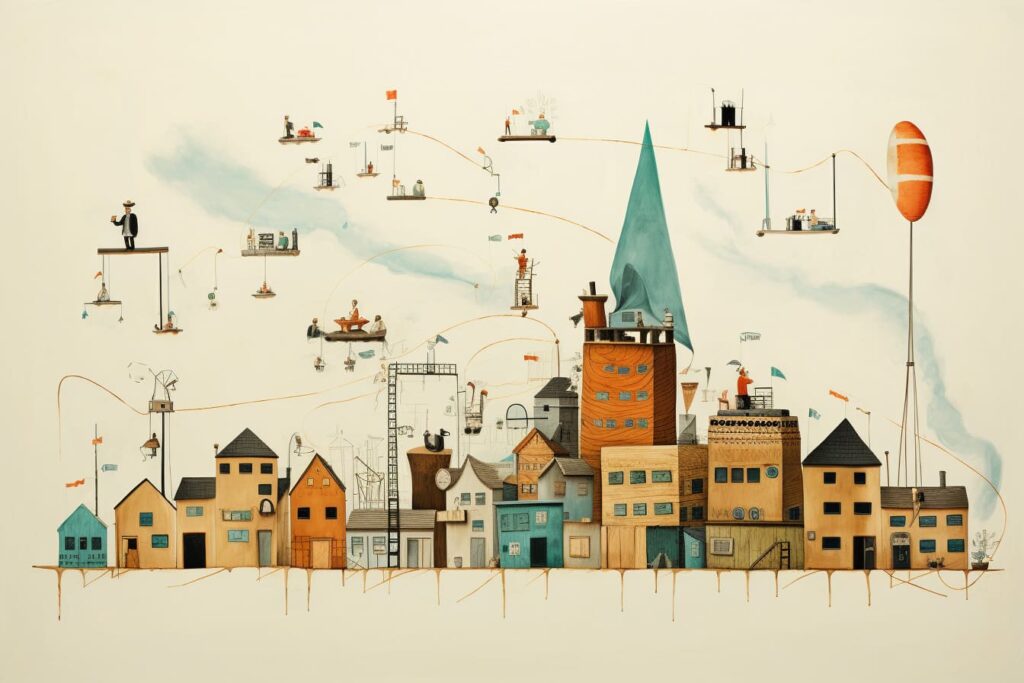Picture this: you’re sitting in your favorite coffee shop, sipping on a latte that costs more than your monthly streaming subscriptions combined, and pondering the mysteries of the financial universe. Suddenly, a stranger in a hoodie approaches you, slides a piece of paper across the table, and whispers, “Invest in DeFi, my friend. It’s the future.” Intrigued, you unfold the paper and find yourself tumbling down a rabbit hole of decentralized finance, or as the cool kids call it, DeFi.
DeFi, for the uninitiated, is like the punk rock rebellion of the financial sector. It’s a movement that aims to decentralize traditional financial services using blockchain technology. In simpler terms, it’s all about cutting out the middleman—those pesky banks and financial institutions—and allowing individuals to directly engage in transactions with one another. No more waiting for approval from a faceless entity; with DeFi, you are the master of your own financial destiny.
At first glance, it seems like a dream come true. DeFi promises to make financial services accessible to anyone with an internet connection, regardless of their background or location. No longer will you be denied a loan because of a lackluster credit score or be subject to the whims of a biased loan officer. With DeFi, all you need is a smartphone and a desire to participate.
But, my friend, as with any revolutionary movement, there are shadows lurking amidst the decentralization hype. While DeFi holds the potential to level the playing field, it also has the power to perpetuate inequality. How? Well, let’s dive into the murky waters of decentralized finance and explore its complexities.
The DeFi Disruption: A Brave New World of Possibilities
Imagine a world where financial services are not controlled by a handful of powerful institutions, but rather by a network of individuals. DeFi opens up a realm of possibilities, from decentralized lending and borrowing platforms to peer-to-peer trading and automated market makers. Suddenly, financial services are no longer exclusive to the elite, but accessible to anyone with an internet connection.
The Dark Side of the Decentralized Moon
While DeFi promises financial freedom for all, it’s not without its drawbacks. First and foremost, DeFi platforms are still in their infancy, prone to vulnerabilities and hacks. Remember that hoodie-clad stranger from the coffee shop? Well, he might not have mentioned the risks of losing all your hard-earned crypto assets to a clever hacker.
Moreover, the very nature of DeFi, which relies heavily on smart contracts, makes it vulnerable to exploits. One minor bug in the code can lead to catastrophic consequences, leaving users high and dry. And let’s not forget about the regulatory hurdles that DeFi faces. Without proper oversight, the risk of scams and fraudulent activities looms large.
The Great Divide: Inequality in the Land of DeFi
While DeFi aims to democratize financial services, it inadvertently perpetuates inequality in its current form. Let’s face it, my friend, not everyone has equal access to the internet or the necessary digital literacy to navigate the intricacies of DeFi. This means that those who are already marginalized or financially excluded may find themselves further left behind in this brave new world.
Additionally, the concentration of wealth within the crypto space raises concerns about wealth inequality. Early adopters and whales can amass significant fortunes, while newcomers struggle to catch up. Imagine a financial system where the rich get richer, and the rest of us are left to navigate the treacherous waters of inequality.
The Future of DeFi: A Balancing Act
As we ponder the fate of DeFi, it’s essential to strike a balance between its potential and the challenges it presents. Regulation, while often seen as a buzzkill, can play a crucial role in safeguarding users’ interests and preventing fraudulent activities. Likewise, efforts to improve digital literacy and expand internet access can ensure that DeFi truly delivers on its promise of financial inclusion.
My friend, DeFi is undoubtedly an exciting frontier in the financial sector. It has the potential to revolutionize the way we interact with money, empowering individuals and challenging the status quo. However, we must remain vigilant and address the inherent risks and inequalities that come hand in hand with this new era of decentralized finance.
So, the next time someone slides a piece of paper across the table and whispers, “Invest in DeFi,” take a moment to consider the bigger picture. Is it the future we’ve been waiting for, or just another chapter in the perpetual struggle for financial equality? The choice, my friend, is yours to make.

